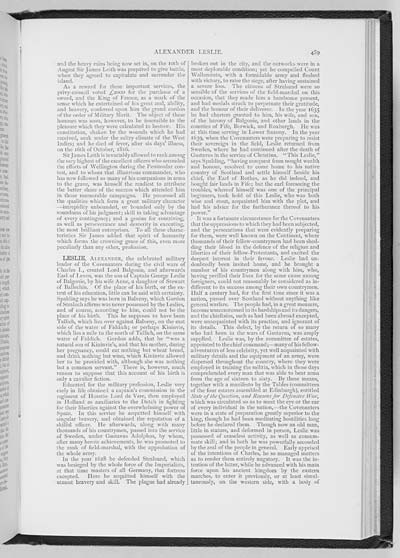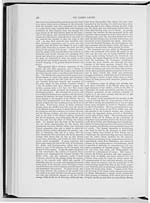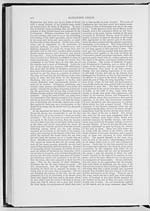489
and the heavy rains being now set in, on the l0th of
August Sir James Leith was prepared to give battle,
when they agreed to capitulate and surrender the
island.
As a reward for these important services, the
privy-council voted 72000 for the purchase of a
sword, and the King of France, as a mark of the
sense which he entertained of his great zeal, ability,
and bravery, conferred upon him the grand cordon
of the order of Military Merit. The object of these
honours was soon, however, to be insensible to the
pleasure which they were calculated to bestow. His
constitution, shaken by the wounds which he had
received, sank under the sultry climate of the West
Indies; and he died of fever, after six days' illness,
on the 16th of October, 1816.
Sir James Leith is in variably allowed to rank among
the very highest of the excellent officers who seconded
the efforts of Wellington during the Peninsular con-
test, and to whom that illustrious commander, who
has now followed so many of his companions in arms
to the grave, was himself the readiest to attribute
the better share of the success which attended him
in those memorable campaigns. He possessed all
the qualities which form a great military character
�intrepidity unbounded, or bounded only by the
soundness of his judgment; skill in taking advantage
of every contingency; and a genius for contriving,
as well as perseverance and dexterity in executing,
the most brilliant enterprises. To all these charac-
teristics Sir James added that spirit of humanity
which forms the crowning grace of this, even more
peculiarly than any other, profession.
LESLIE, ALEXANDER, the celebrated military
leader of the Covenanters during the civil wars of
Charles I., created Lord Balgonie, and afterwards
Earl of Leven, was the son of Captain George Leslie
of Balgonie, by his wife Anne, a daughter of Stewart
of Ballechin. Of the place of his birth, or the ex-
tent of his education, little can be said with certainty.
Spalding says he was born in Balveny, which Gordon
of Straloch affirms was never possessed by the Leslies,
and of course, according to him, could not be the
place of his birth. This he supposes to have been
Tullich, which lies over against Balveny, on the east
side of the water of Fiddich; or perhaps Kininvie,
which lies a mile to the north of Tullich, on the same
water of Fiddich. Gordon adds, that he "was a
natural son of Kininvie's, and that his mother, during
her pregnancy, could eat nothing but wheat bread,
and drink nothing but wine, which Kininvie allowed
her to be provided with, although she was nothing
but a common servant." There is, however, much
reason to suppose that this account of his birth is
only a cavalier fiction.
Educated for the military profession, Leslie very
early in life obtained a captain's commission in the
regiment of Horatio Lord de Vere, then employed
in Holland as auxiliaries to the Dutch in fighting
for their liberties against the overwhelming power of
Spain. In this service he acquitted himself with
singular bravery, and obtained the reputation of a
skilful officer. He afterwards, along with many
thousands of his countrymen, passed into the service
of Sweden, under Gustavus Adolphus, by whom,
after many heroic achievements, he was promoted to
the rank of field-marshal, with the approbation of
the whole army.
In the year 1628 he defended Stralsund, which
was besieged by the whole force of the Imperialists,
at that time masters of all Germany, that fortress
excepted. Here he acquitted himself with the
utmost bravery and skill. The plague had already
broken out in the city, and the outworks were in a
most deplorable condition; yet he compelled Count
Wallenstein, with a formidable army and flushed
with victory, to raise the siege, after having sustained
a severe loss. The citizens of Stralsund were so
sensible of the services of the field-marshal on this
occasion, that they made him a handsome present,
and had medals struck to perpetuate their gratitude,
and the honour of their deliverer. In the year 1635
he had charters granted to him, his wife, and son,
of the barony of Balgonie, and other lands in the
counties of Fife, Berwick, and Roxburgh. He was
at this time serving in Lower Saxony. In the year
1639, when the Covenanters were preparing to resist
their sovereign in the field, Leslie returned from
Sweden, where he had continued after the death of
Gustavus in the service of Christina. "This Leslie,"
says Spalding, "having conquest from nought wealth
and honour, resolved to come home to his native
country of Scotland and settle himself beside his
chief, the Earl of Rothes, as he did indeed, and.
bought fair lands in Fife; but the earl foreseeing the
troubles, whereof himself was one of the principal
beginners, took hold of this Leslie, who was both
wise and stout, acquainted him with the plot, and
had his advice for the furtherance thereof to his
power."
It was a fortunate circumstance for the Covenanters
that the oppressions to which they had been subjected,
and the persecutions that were evidently preparing
for them, were well known on the Continent, where
thousands of their fellow-countrymen had been shed-
ding their blood in the defence of the religion and
liberties of their fellow-Protestants, and excited the
deepest interest in their favour. Leslie had un-
doubtedly been invited home, and he brought a
number of his countrymen along with him, who,
having perilled their lives for the same cause among
foreigners, could not reasonably be considered as in-
different to its success among their own countrymen.
Half a century had, for the first time since it was a
nation, passed over Scotland without anything like
general warfare. The people had, in a great measure,
become unaccustomed to its hardships and its dangers,
and the chieftains, such as had been abroad excepted,
were unacquainted with its practice, and ignorant of
its details. This defect, by the return of so many
who had been in the wars of Gustavus, was amply
supplied. Leslie was, by the committee of estates,
appointed to the chief command;�many of his fellow-
adventurers of less celebrity, yet well acquainted with
military details and the equipment of an army, were
dispersed throughout the country, where they were
employed in training the militia, which in those days
comprehended every man that was able to bear arms
from the age of sixteen to sixty. By these means,
together with a manifesto by the Tables (committees
of the four estates assembled at Edinburgh), entitled
State of the Question, and Reasons for Defensive War,
which was circulated so as to meet the eye or the ear
of every individual in the nation,�the Covenanters
were in a state of preparation greatly superior to the
king, though he had been meditating hostilities long
before he declared them. Though now an old man,
little in stature, and deformed in person, Leslie was
possessed of ceaseless activity, as well as consum-
mate skill; and in both he was powerfully seconded
by the zeal of the people in general. Early apprised
of the intentions of Charles, he so managed matters
as to render them entirely nugatory. It was the in-
tention of the latter, while he advanced with his main
force upon his ancient kingdom by the eastern
marches, to enter it previously, or at least simul-
taneously, on the western side, with a body of

![]() Universal Viewer |
Universal Viewer | ![]() Mirador |
Large image | Transcription
Mirador |
Large image | Transcription
![]()

